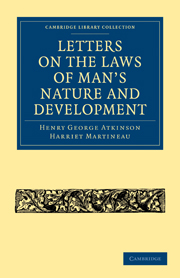Book contents
- Frontmatter
- Preface
- Mottoes
- Contents
- Letter. 1 Inquiry for a Basis
- Letter. 2 Proposal of a Basis
- Letter. 3 Preparation of the Ground
- Letter. 4 What is the Brain?
- Letter. 5 Inquiry about its Structure
- Letter. 6 Early days of Phrenology
- Letter. 7 Inquiry for New Discoveries
- Letter. 8 Methods of New Discovery. Organic Arrangement of the Brain
- Letter. 9 Illustrative Cases
- Letter. 10 Organic Arrangement of the Cerebrum
- Letter. 11 Dr. Howe's Report on Idiocy
- Letter. 12 The Senses and Nervous System
- Letter. 13 Illustrative Comment
- Letter. 14 Facts about the Senses under various conditions
- Letter. 15 Raising questions
- Letter. 16 Bacon, on Matter and Causation. Inferences and Dreams. Association of Ideas
- Letter. 17 Nothing
- Letter. 18 Knowledge and Notions. Results of each
- Letter. 19 Release from Notions. Entrance upon Knowledge
- Letter. 20 Natural History of Superstition
- Letter. 21 Theology and Science
- Letter. 22 Central Law and Pervasive Unity. Light. Sense of Identity. Ghost-seeing. Unrevealed Human Relations
- Letter. 23 Position and Privilege of Truth-seekers
- Letter. 24 Position and Privilege of Truth-speakers
- Appendix
Letter. 6 - Early days of Phrenology
Published online by Cambridge University Press: 29 August 2010
- Frontmatter
- Preface
- Mottoes
- Contents
- Letter. 1 Inquiry for a Basis
- Letter. 2 Proposal of a Basis
- Letter. 3 Preparation of the Ground
- Letter. 4 What is the Brain?
- Letter. 5 Inquiry about its Structure
- Letter. 6 Early days of Phrenology
- Letter. 7 Inquiry for New Discoveries
- Letter. 8 Methods of New Discovery. Organic Arrangement of the Brain
- Letter. 9 Illustrative Cases
- Letter. 10 Organic Arrangement of the Cerebrum
- Letter. 11 Dr. Howe's Report on Idiocy
- Letter. 12 The Senses and Nervous System
- Letter. 13 Illustrative Comment
- Letter. 14 Facts about the Senses under various conditions
- Letter. 15 Raising questions
- Letter. 16 Bacon, on Matter and Causation. Inferences and Dreams. Association of Ideas
- Letter. 17 Nothing
- Letter. 18 Knowledge and Notions. Results of each
- Letter. 19 Release from Notions. Entrance upon Knowledge
- Letter. 20 Natural History of Superstition
- Letter. 21 Theology and Science
- Letter. 22 Central Law and Pervasive Unity. Light. Sense of Identity. Ghost-seeing. Unrevealed Human Relations
- Letter. 23 Position and Privilege of Truth-seekers
- Letter. 24 Position and Privilege of Truth-speakers
- Appendix
Summary
H. G. A. to H. M.
“What is the brain?”
The brain is the organ from whose action arises all that class of phenomena which we term Mind: in which I include all our sensations, perceptions, emotions, judgments and intuitions; consciousness, will, and certain forces which tend to regulate, stimulate and control the other functions of the body. This, you perceive, is giving to the brain a larger sphere of action than is assigned to it in the works on phrenology. I differ also from phrenologists in this; that I consider consciousness, will, pleasing or painful sensations, &c., to be distinct faculties, and the functions of special organs. You know the brain; I need therefore only remind you that there are, in fact, two brains: the cerebrum occupying the larger portion of the skull, and the cerebellum in a separate compartment, beneath the posterior lobe of the cerebrum, occupying the space behind the ears. It has happened to me to be able to demonstrate that this lesser brain is not what Gall supposed it to be; that is, the organ of the amative propensity: but the organ of that class of powers which might perhaps, for distinction's sake, be termed the physico-functional powers; or those powers having a more immediate relation to the bodily conditions—the muscular power, and other purely bodily relations, secretions, &c. But, whatever importance I may attach to the knowledge of the functions of this and of some other parts, I trust you will not consider it presumption in me, or that I wish in any way to force these views upon others, or to take from the value of their labours.
- Type
- Chapter
- Information
- Letters on the Laws of Man's Nature and Development , pp. 29 - 41Publisher: Cambridge University PressPrint publication year: 2009First published in: 1851



